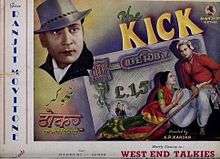Thokar
Thokar also called The Kick is 1939 Hindi/Urdu film directed by A. R. Kardar. Produced by Chandulal Shah for his production banner Ranjit Movietone, it had music by Gyan Dutt.[1] The story writer was M. Sadiq, with cinematography by Gordhanbhi Patel.[2] The cast included Kumar, Ishwarlal, Madhuri, Yakub, Noor Mohammed Charlie, Ram Marathe, Waheedan Bai and Dixit.[3]
| Thokar | |
|---|---|
 Film poster ad in Filmindia (1939) | |
| Directed by | A. R. Kardar |
| Produced by | Chandulal Shah |
| Written by | M. Sadiq |
| Starring | Madhuri Kumar Charlie Waheedan Bai Ram Marathe |
| Music by | Gyan Dutt |
| Cinematography | Gordhanbhai Patel |
Production company | |
Release date | 1939 |
| Country | British India |
| Language | Hindi |
Thokar is cited as one of the "most interesting" films made by Kardar for Ranjit Movietone. The other was Pagal (1940).[4] The story involved a blind villager winning a lottery but he eventually realises that money can not bring happiness.[5] Baburao Patel, editor of the cine magazine Filmindia, called it one of the "good social pictures" and "the best" from Chandulal Shah.[6]
Plot
Mohan is a poor blind villager taking care of his ward Radha, who is in love with him. The village tramp, Ramesh (Charlie) sells him a lottery ticket. To Mohan's astonishment, he wins the sweep-stakes but Ramesh wants his share. Ramesh takes Mohan to the city with the intention of getting his eyes treated. In the city, Ramesh deviously gets Mohan married off to a prostitute who is having an affair with Ramesh. When Mohan's eyesight is restored, he sees his wealth diminishing, and an adulterous wife. He takes revenge on Ramesh and his wife. Mohan finally returns to the village and to Radha.
Cast
- Ishwarlal
- Madhuri as Radha
- Kumar as Mohan
- Charlie as Ramesh
- Yakub
- Waheedan Bai
- Dixit
- Ram Marathe
- Suresh
- K. N. Singh
- Wasti
Soundtrack
Charlie has been cited as "the first (Indian) comedian to have songs picturised on him", starting the trend with the song from Thokar, "Jab Se Mali Teri Khak".[7] The music was composed by Gyan Dutt and the lyricist was Pyare Lal Santoshi. The singers were Waheedan Bai, Suresh, Ram Marathe and Charlie.[8]
Song List
| # | Title | Singer |
|---|---|---|
| 1 | "Achchhe Isa Ho Marizon Ka Kayal Achhha Ho" | Waheedan |
| 2 | "Aankhon Aankhon Mein Pila Di Mere Saqi Ne" | Waheedan |
| 3 | "Ae Zamane Phir Se Ram Milaye Jodi" | |
| 4 | "Jabse Gaye Banwari | Madhuri, Suresh, Ram Marathe" |
| 5 | "Jeevan Ka Sukh Prem Hai" | |
| 6 | "Jhan Jhan Jhan Sajan Bole" | |
| 7 | "Kaali Kaali Jo Ghata Chhayi Hai" | Waheedan Bai |
| 8 | "Main Banoon Nadi Main Banoon Kinara" | Waheedan, Noor Mohammed Charlie |
| 9 | "Suno Brij Ki Ek Kahani" | |
| 10 | "Jab Se Mali Teri Khak"[7] | Charlie |
References
- "Cast and crew of Thokar (1939)". gomolo.com. Gomolo. Retrieved 28 March 2015.
- "Thokar (1930)". indiancine.ma. IndianCine.ma. Retrieved 28 March 2015.
- "Thokar". citwf.com. Alan Goble. Retrieved 28 March 2015.
- Bhagwan Das Garga (1996). So many cinemas: the motion picture in India. Eminence Designs. ISBN 978-81-900602-1-9. Retrieved 28 March 2015.
- Ashish Rajadhyaksha; Paul Willemen (10 July 2014). Encyclopedia of Indian Cinema. Taylor & Francis. pp. 1994–. ISBN 978-1-135-94325-7. Retrieved 28 March 2015.
- Patel, Baburao (September 1940). "Filmindia". Filmindia. 6 (9): 29. Retrieved 28 March 2015.
- Sanjit Narwekar (1 January 2005). Eena Meena Deeka: The Story of Hindi Film Comedy. Rupa & Company. pp. 1914–. ISBN 978-81-291-0859-3. Retrieved 28 March 2015.
- "Thokar (1939)". muvyz.com. Muvyz, Ltd. Retrieved 28 March 2015.